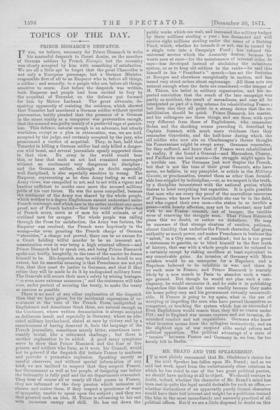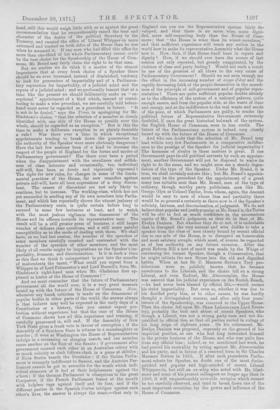MR. BRAND AND THE SPEAKERSHIP,
I T is now plainly announced that Mr. Gladstone's choice for 1 the next Speaker has fallen upon Mr. Brand ; and as we said last week, apart from the unfortunately close relations in which he has stood to one of the two great political parties, we should have nothing at all to object. We should venture ta doubt, indeed, whether the character of Mr. Brand's mind has been cast in quite the legal mould clearable for such an office,— whether distinctions of an apparently purely formal character would have their full interest and weight for a politician trained like him in the most immediately and narrowly practical of all political offices. But if we are a little disposed to doubt on this head, still this would weigh little with us as against the great recommendation that he unquestionably raised the tone and character of the duties of the political Secretary to the Treasury, and vacated the office of Liberal Whipper-in more esteemed and trusted on both sides of the House than he was when he assumed it. If any man who had filled this office for more than one-third of his whole Parliamentary career, could be the best choice for the Speakership of the House of Com- mons, Mr. Brand may fairly claim the right to be that man. But we confess we do think it a matter of the utmost importance that at every fresh choice of a Speaker there should be an even increased, instead of diminished, tendency to look for guarantees of impartiality and of a Parliamen- tary reputation for impartiality, of a judicial mind and the repute of a judicial mind ; and we profoundly lament that at a time like the present we should deliberately make an " ex- ceptional " appointment of a kind which, instead of contri- buting to make a wise precedent, we are carefully told before- hand must never be regarded as a precedent in future. "It is not to be denied," says the Times, in apologizing for Mr. G. ladstone's choice, "that the selection of a member so closely identified with one side of the House to preside over the whole, should be regarded as an exception." But is this the time to make a deliberate exception to so plainly desirable a rule ? Was there ever a time in which exceptional appointments tending to break down the guarantees for the authority of the Speaker were more obviously dangerous ? Have the lad few sessions been of a kind to increase the respect of the people of England for the forma and modes of Parliamentary government Has there ever been a period when the disappointment with the unruliness and selfish- ness of class interests and occasionally, too, individual self-will, has been so freely and vigorously expressed ? The sighs for new rules, for changes in some of the funda- mental practices of the House, for new remedies against private self-will, have all been expressions of a deep discon- tent. The causes of discontent are not only likely to continue, but to increase. The working-class, which has not yet succeeded in sending any of its own members into Parlia- ment, and which has repeatedly shown the utmost jealousy of the Parliamentary caste, is quite certain before long to succeed in some few instances at least, and to watch with the most jealous vigilance the demeanour of the House and its officers towards its representative men. The result will be a still greater press of business, a still larger number of delicate class questions, and a still more painful susceptibility as to the mode of dealing with them. We shall have, as we had last session, the number of the speeches of some members carefully counted and contrasted with the number of the speeches of other members, and the most likely of all results might be imputations on the Speaker's im- partiality, firmness, and discrimination. Is it in such a time as this that we think it unimportant to put into the mouths of malcontents the taunt, "What could you expect from a Whipper-in of Lord Palmerston 's and Lord Russell's, from Mr. Gladstone's right-hand man when Mr. Gladstone first ap- peared as leader of the House of Commons?" And we must remember that the future of Parliamentary government all the world over, is in a very great measure bound up with the future of the House of Commons. Now, whenever any harsh criticism is made on the demeanour of popular bodies in other parts of the world, the answer always is that failures may well be expected in the early days of a Constitution or a history, that you cannot expect per- fection without experience, but that the case of the House of Commons shows how all this experience and training, if carefully persevered in, will end. If the Assembly of New York State gives a frank vote in favour of corruption ; if the Assembly of a Southern State is witness to a manslaughter or murder ; if even at Washington the House of Representatives indulge in a screaming or slanging match, and one member canes another on the floor of the Senate ; if government after government succeed each other in an Australian colony with as much velocity as clash follows clash in a game at skittles ; if Nova Scotia beards the Dominion ; if the Italian Parlia- ment is strangely indifferent to finance, and the Austrian Par- liament cannot be got to assemble for the wrath which indi- vidual elements of it feel at their helplessness against the others ; if the German Parliament is obsequious to the great Conqueror, if the French Parliament foams at the mouth with helpless rage against itself and its foes, and if the different parties in the Spanish Cortes intrigue against each other's lives, the answer is always the same,—that only in England can you see the Representative system fairly de- veloped, and that there is no more wise, more digni- fied, more self-,respecting body than the House of Com- mons; that "the House is wiser than its wisest members," and that sufficient experience will teach any nation in the world how to make its representative Assembly what the House now is. How, then, if that House itself loses in repute and dignity ? How, if we should ever have the scenes of last session not only repeated, but grossly exaggerated, by the violence of class and party feeling ? Would not such a result be one of the greatest of all blows to the very cause of Parliamentary Government ? Should we not soon enough see the effect in the increasing number of coups d'etat and the rapidly decreasing faith of the people themselves in the sacred- ness of the principle of self-government and of popular repre- sentation? There are quite sufficient popular doubts already as to the efficiency of the system of a national palaver, quite enough sneers, and from the popular side, at the waste of time and energy, and at the indifference to the real wants and needs of the poor, of which Parliaments are guilty, to render the political future of Representative Government extremely doubtful, if once the great historical bulwark of the system, the English House of Commons, were to lose credit. The future of the Parliamentary system is indeed very closely bound up with the future of the House of Commons.
And who can doubt that the selection of Mr. Brand may lead within very few Parliaments to a comparative indiffer- ence to the prestige of the Speaker for judicial impartiality ? The keenness of rivalry in these matters is great. If one Government pays its old political servants by such an appoint- ment, another Government will not be disposed to waive its right to do the same, and we might soon see a steady degra- dation of the type of the Speaker. Under Mr. Brand, it is true, we shall certainly not see this ; but Mr. Brand's appoint- ment may be the precedent for the appointment of a great many less suitable men than Mr. Brand, men of the type of ordinary, though worthy party politicians, men like Mr. George Glyn or Colonel Taylor, from whom, again, the descent would be easy to men of whose bias and partiality there would be as general a certainty as there now is of the Speaker's sobriety, fairness, and discrimination of judgment. We do not believe that popular and j ustly popular as Mr. Brand is, the Tories will be able to feel as much confidence in the unconscious equity of Mr. Brand's judgment, as they do in that of Mr. Evelyn Denison. But whether they do or not, it is undeniable that to disregard the very natural and wise dislike to take a speaker from the class of men closely bound by recent official ties to one side of the House, is to disregard an honourable and most salutary scruple, which must, of course, be regarded as of less authority on any future occasion. After the great Reform Bill a sort of merit was made by the Whigs of continuing the former Speaker, though a Conservative, that he might initiate the new House into the old and dignified habits. When at last Sir C. Manners Sutton's Tory pre- dilections were so publicly known that he became unwelcome to the Liberals, and the choice fell on a strong Liberal, and even Radical, Mr. Abercrombie, the House was assured that his judicial experience on the Scotch Bench, —he had never been biassed by official life,—would ensure his strict impartiality. But even so, whether it was due to his decided party bias, or to other causes, he was hardly thought a distinguished success, and after only four years' tenure of the Speakership, was removed to the Upper House. Then the choice fell upon Mr. Shaw Lefevre (now Lord Evers- ley), probably the best and ablest of recent Speakers, who though a Liberal, was not a strong party man and not dis- qualified by official ties, so that all parties united in eulogy of his long reign of eighteen years. On his retirement, Mr. Evelyn Denison was proposed, expressly on the ground of his impartial position, as one who had long interested himself in the private business of the House, and who was quite free from any official bias ; indeed, as we mentioned last week, he had proved his neutrality by voting against Mr. Abercrombie and his party, and in favour of a renewed term to Sir Charles Manners Sutton in 1835. If after such precedents Parlia- ment selects for Speaker, no doubt one of the most distin- guished and popular and high-minded of recent Liberal Whippers-in, but still an ex-whip who acted with Mr. Glad- stone and some of his present colleagues no longer ago than in 186G, it will unquestionably over-ride scruples which cannot be too carefully observed, and tend to break down one of the most important securities for the power and influence of the House of Commons.



































 Previous page
Previous page